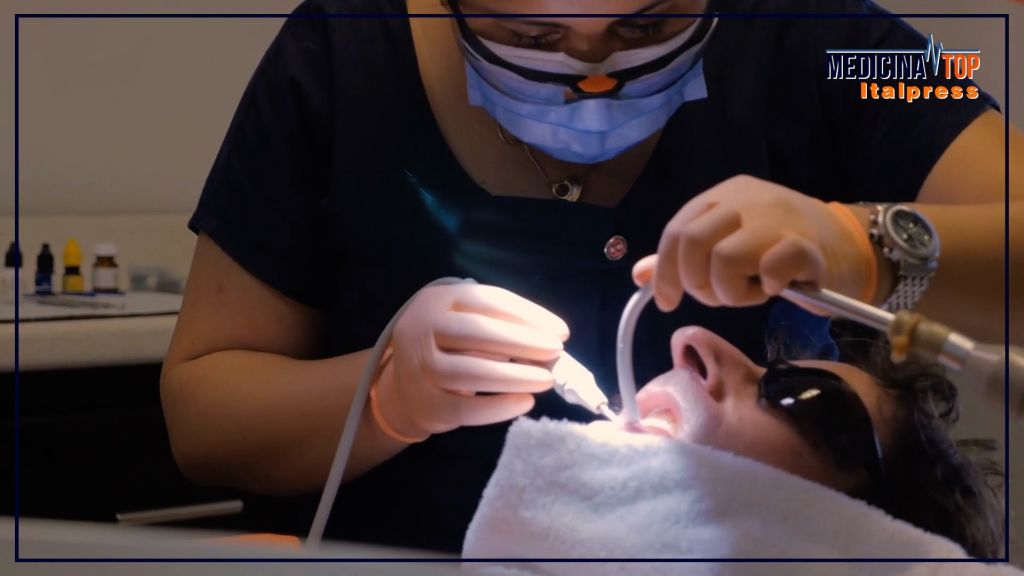MILAN (ITALPRESS) – Dental implantology is an advanced branch of dentistry that deals with the replacement of missing teeth using dental implants. These are artificial roots made of titanium or zirconia that are biocompatible and surgically inserted into the maxillary or mandibular bone. The implants serve as a base to support crowns, bridges, or dentures, restoring chewing and smile aesthetics. Not all patients are ideal candidates for implants: the health of the gums, the amount of available bone, and habits such as smoking can affect the success of the procedure, which requires a deep understanding of the patient and careful planning. These are some of the topics discussed by Francesco Epifani, a specialist in dentistry and adjunct professor of dentistry and prosthodontics at the University of Milan, who also works at the university department of the Trauma Institute of Milan, interviewed by Marco Klinger, for Medicina Top, a TV format of the Italpress news agency. “A medical tourism has always been there, I remember when in Holland in one day they would take out all your teeth, you would come back with a prosthesis and after four days they were like slippers bigger than four numbers,” he began, immediately addressing the topic of the much-discussed surgeries abroad. “There has always been this attempt to look for countries where life costs less. Now more than ever this is a widespread phenomenon. For teeth, there is a lot of talk about Albania for countries opposite Albania, just as there used to be talk about teeth in Yugoslavia for people from Trieste,” Epifani recalled, “In Trieste, colleagues went through very difficult times, they were no longer providing services. Now there is this phenomenon of Albania, especially from Puglia.” There are several critical issues related to dental implantology procedures performed abroad: “The patient turns to a business attorney, who is not a doctor and who tries to capture patients with whom he talks exclusively about the economic part, and this is already a great distortion,” he explained. “The professional figure of the doctor, who directs to the most appropriate therapy for the interests of the patient and not of the facility or the doctor, is missing. To avoid suddenly finding oneself forced to have dental implant surgery, Epifani recalls the importance of prevention: “Today, the tax burden and the charges for an adequate facility are increasingly heavy. We are forced to provide services that cannot compete with prices in other countries. The National Health System intervenes in all services concerning conservative, tooth extraction and minor surgery. It does not intervene in the next part, which is prosthetic,” the professor stressed, “If you can do prevention, you do not reduce yourself in such a way that you are forced to run to Albania. The Asl provides preventive interventions: the more we do, the more we will need to do great interventions. This is the most simplistic way to approach the problem. Even doing so many implants at that speed and imagining doing a good prosthesis is madness,” he reiterated, “I have seen cases abroad that were of very good quality and others that looked like they were done by people studying philosophy. “You can’t imagine shortening and contracting and solving a problem that a patient has been carrying around for so many years with four sessions in four days in a row, otherwise we haven’t understood anything,” he attacked. “And when you have problems, then you don’t have a reference: when you have the surgery in one of those facilities abroad, you never know the name and face of the professional who will treat the patient, but can you then imagine treating a patient without having conversed with him first? The doctor-patient relationship is lost.” Finally, on costs in Italy that are often too high and the role that politics can play: “Italian dentistry is at the top of the world. We have great schools, better than that we cannot fall – Epifani acknowledged – We need to come to the aid of a social population that cannot afford high-cost care. We should intervene with political choices,” he concluded, “I know of regions where we reason socially and try to meet the needs of the less affluent, and especially those who have functional and not just aesthetic needs.
– photo taken from Top Medicine video – (ITALPRESS).

